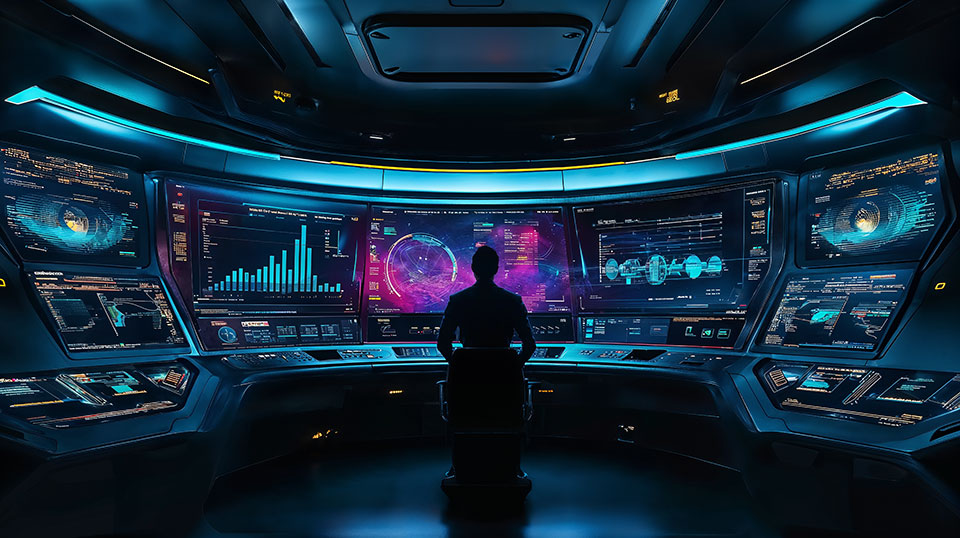The Marketing Revolution Is Here
Picture your marketing team in 2019: A social media specialist crafting posts, a content writer planning blogs, an email marketer scheduling campaigns, and a paid ads expert optimizing spend. Each in their silo, each commanding a healthy salary, each mastering their narrow slice of the marketing pie.
Now fast forward to 2025. That entire team has been replaced by one person and an AI system.
This isn’t science fiction – it’s happening right now. We’re witnessing the biggest transformation in marketing history, as artificial intelligence dismantles traditional marketing roles and rebuilds them into something entirely new. The marketing department of 2019 is becoming as obsolete as the typing pool of 1980.
But here’s what’s truly shocking: Today’s AI capabilities are the WORST they will ever be. Let that sink in. The marketing roles disappearing today are just the beginning. By 2025, the transformation will be complete, creating an unbridgeable gap between companies that adapted and those that clung to outdated structures.
For business leaders, the choice is clear: Adapt to this new reality, or watch your competitors operate at speed and scale you can’t match with traditional teams.

The Traditional Marketing Department: A Model Ready for Disruption
Look inside any traditional marketing department and you’ll see the same costly puzzle: A social media manager ($65,000), content writer ($55,000), email specialist ($60,000), paid ads expert ($75,000), and graphic designer ($60,000). That’s over $315,000 in salaries alone – before benefits, software subscriptions, or management overhead.
But the real cost isn’t just financial. These siloed specialists are becoming the business equivalent of flip phones in a smartphone world: functional, but fundamentally limited.
The social media manager waits for the content writer, who waits for the graphic designer, who’s backed up with email campaign assets.
Meanwhile, your competitors’ AI systems are creating, testing, and optimizing entire campaigns in hours, not weeks.
Consider this: Most marketing specialists spend 60% of their time on tasks that AI now does better. Your email marketer spends hours A/B testing subject lines – AI tests 100 variations in minutes. Your content writer crafts two blog posts per week – AI generates and optimizes 50 in the same time.
The hidden cost? While your fragmented team struggles with coordination meetings and handoffs, your market share is silently eroding to competitors who’ve embraced the AI revolution.
Understanding the AI-Driven Role Consolidation Effect
Remember when every company needed a webpage designer? Today, that role barely exists – tools like Wix and Shopify made it obsolete. Now, AI is doing the same thing to traditional marketing roles, but at an unprecedented scale.
Role consolidation isn’t just about automating tasks – it’s about fundamentally transforming how marketing work gets done. Instead of ten specialists handling ten different aspects of marketing, one AI-empowered generalist can orchestrate entire campaigns with greater efficiency and consistency.
Here’s the paradigm shift: AI removes the need for years of specialized experience in each marketing discipline. Want to write high-converting email sequences? AI understands customer psychology and copywriting principles better than most veteran copywriters. Need engaging social content? AI analyzes millions of top-performing posts to craft platform-perfect messaging instantly.

The new marketing professional isn’t a specialist in any single area – they’re an orchestrator, using AI to execute across all channels with expert-level proficiency. They don’t need deep domain expertise because the AI provides it. They don’t need years of experience in each platform because the AI has analyzed billions of successful campaigns.
This isn’t just efficiency – it’s a fundamental reimagining of marketing roles that’s making traditional specialist positions as relevant as telephone operators in 2024.
Key Areas Where Marketing Roles Are Merging
Five years ago, these five marketing functions required five different experts and a $400,000+ annual budget. Today, they represent the unified toolkit of a single AI-empowered Fractional CMO. Here’s how the convergence is happening:
Content Creation & Copy: While your competitors still wait days for their copywriters to craft a single sales letter, an AI-enhanced Fractional CMO generates and tests multiple versions in hours. Email sequences, social posts, blog articles – all created with expert-level proficiency, informed by real-time market data.
Design & Visual Production: Gone are the endless revision cycles with graphic designers. Today’s Fractional CMO uses AI to generate professional brand visuals, social media graphics, and marketing collateral instantly, maintaining perfect brand consistency across all channels.
Campaign Management: Instead of juggling multiple specialists and timelines, your Fractional CMO orchestrates comprehensive campaigns across all platforms simultaneously. What once required a team of platform experts now flows through a single, AI-powered command center.
Analytics & Optimization: Rather than waiting for monthly reports from your analytics team, your Fractional CMO has real-time access to AI-processed insights across all channels. Campaigns are optimized automatically, with performance improvements implemented in minutes, not weeks.
Strategy & Implementation: The days of strategy getting lost in execution are over. Your Fractional CMO doesn’t just plan – they use AI to implement, test, and refine strategies in real-time, ensuring perfect alignment between vision and execution.
This isn’t just about doing more with less – it’s about doing it better. A skilled Fractional CMO, armed with AI, doesn’t just replace these five roles – they transform them into a seamless, integrated marketing function that operates with unprecedented speed and precision.

The New Marketing Professional
Meet the marketing leader of 2025: Not a collection of specialized skills, but a strategic orchestrator who leverages AI to execute at the level of an entire traditional marketing department. This isn’t just a role change – it’s an evolution in what it means to be a marketing professional.
The most valuable marketers today are the perpetual learners – those who’ve spent years collecting diverse skills across multiple disciplines. Each new skill they master becomes exponentially more powerful when amplified by AI. A marketer who understands both copywriting and design can now orchestrate complete brand campaigns. Add video production knowledge? Now they’re creating multi-channel content strategies that would have required an entire agency.

The new skillset is radically different. Instead of deep expertise in one area, today’s marketing leader needs:
- AI Orchestration Mastery: The ability to prompt, direct, and refine AI outputs across all marketing functions
- Strategic Pattern Recognition: Identifying opportunities that AI can execute across multiple channels simultaneously
- Systems Integration Vision: Understanding how to connect AI tools into seamless marketing workflows
- Human-AI Collaboration: Knowing when to leverage AI and when to apply human creativity and judgment
- Rapid Testing & Iteration: Using AI to test hundreds of variations while maintaining brand consistency
Each additional skill mastered doesn’t just add to a marketer’s value – it multiplies it. Understanding email marketing? AI turns that into automated nurture sequences. Knowledge of paid ads? AI transforms that into multi-platform campaign optimization. Social media expertise? AI scales that into content generation across every platform.
This shift makes traditional specialization nearly irrelevant. Why spend years mastering Facebook Ads when AI can outperform human experts in hours? Why hire a dedicated email marketer when AI can craft and optimize entire sequences instantly?
The most valuable skill isn’t technical expertise – it’s the curiosity to continuously learn and adapt, coupled with the ability to see the bigger picture and direct AI resources effectively. One experienced, multi-skilled marketing leader with strong AI literacy can now accomplish what once required an entire marketing department, delivering better results at a fraction of the cost.
This is why forward-thinking companies are rapidly shifting from large marketing teams to single, AI-empowered Fractional CMOs who can provide comprehensive marketing leadership without the overhead of traditional department structures.
The Financial Impact
According to McKinsey’s 2024 “State of AI” report, companies that have adopted AI-enhanced marketing operations are seeing cost reductions of 40-60% while achieving 25-35% better performance metrics. The financial impact isn’t just in salary savings – it’s a complete transformation of marketing economics.
Let’s break down the numbers:
- Traditional Marketing Department (Annual Costs):
Marketing Team Salaries: $315,000-$425,000 - Benefits and Overhead (35%): $110,250-$148,750
Software/Tools: $45,000-$65,000 - Management Costs: $125,000-$175,000
- Total: $595,250-$813,750
AI-Enhanced Fractional CMO Model:
- All-Inclusive Monthly Rate: $3,500
(Includes Fractional CMO services, all AI tools, and support systems) - Total Annual Cost: $42,000
This is transformative for entrepreneurs and growing businesses. Rather than planning for the eventual hire of an entire marketing team – a major barrier to growth for many startups – founders can now access comprehensive marketing leadership and execution for a fraction of the cost. The same marketing capabilities that once required a full department can now be achieved through a single, AI-empowered Fractional CMO.
Deloitte’s “Future of Marketing” study (2024) found that companies switching to AI-enhanced marketing leadership are seeing:
- 71% reduction in time-to-market for campaigns
- 43% increase in campaign performance
- 65% decrease in operational costs
“The hidden savings are often more significant than the obvious ones… When you eliminate the need for coordination between specialists, you’re not just saving salaries – you’re removing entire layers of complexity and delay from your marketing operations.” – Boston Consulting Group
PwC’s research reveals that companies using AI-enhanced marketing leadership are seeing ROI improvements of 150-300% compared to traditional department structures, primarily due to:
- Faster campaign deployment
- Real-time optimization
- Reduced resource waste
- Elimination of coordination bottlenecks
Accenture’s 2024 Digital Transformation Index shows that businesses adopting AI-enhanced marketing leadership are achieving revenue growth 2.3x faster than those maintaining traditional department structures, while operating at approximately one-fourteenth of the cost.
The financial impact extends beyond direct costs. According to Gartner’s latest CMO survey, companies using AI-enhanced marketing leadership report:
- 40% reduction in vendor management costs
- 55% decrease in campaign production time
- 63% improvement in budget utilization
This isn’t just cost-cutting – it’s a fundamental improvement in marketing economics that’s giving early adopters a significant competitive advantage in market responsiveness and resource efficiency.

Making the Transition
Let’s examine two distinct transition paths, focusing primarily on businesses currently using multiple specialized agencies:
From Multiple Agencies to Fractional CMO
- Assessment Phase (1-2 Weeks):
- Audit Current Agency Relationships
- List all active agency contracts and fees
- Document deliverables from each agency
- Identify overlaps and gaps in services
- Calculate total monthly marketing spend
- Contract Review
- Review termination clauses and notice periods
- Identify which agencies are month-to-month
- Plan staged transition to avoid disruption
- Create handover requirements list
Implementation Strategy:
Month 1: Foundation
- Onboard Fractional CMO
- Grant access to all existing platforms
- Review current agency performance data
- Begin consolidating marketing data
Month 2: Strategic Takeover
According to BCG, a phased agency transition reduces risk by 75%. Focus on:
- Transitioning one channel at a time
Starting with highest-cost or underperforming agencies - Maintaining critical campaigns during handover
- Building new agents and automated workflows
Month 3: Optimization
- Complete agency transitions
- Consolidate reporting
- Implement unified strategy
- Launch enhanced campaigns
PwC reports that businesses transitioning from multi-agency models to AI-enhanced Fractional CMO leadership typically see:
- 45% reduction in total marketing costs
- 60% faster campaign deployment
- 35% improvement in cross-channel coordination
Key Advantages of Agency-to-Fractional Transition:
- Simpler handover process
- Fewer internal change management requirements
- Faster implementation timeline
- Immediate cost savings
According to Deloitte’s 2024 Digital Marketing Survey, businesses previously using multiple agencies report:
- 70% reduction in coordination time
- 55% fewer review cycles
- 40% faster campaign launches
- 85% improvement in cross-channel consistency
Common Agency Transition Challenges & Solutions:
Challenge 1: Data Fragmentation
- Solution: Centralize data from all agencies
- Create unified reporting structure
- Implement comprehensive tracking system
Challenge 2: Campaign Continuity
- Solution: Staged transition approach
- Maintain critical campaigns during handover
- Document all active campaigns and assets
Challenge 3: Asset Management
- Solution: Comprehensive asset inventory
- Secure access to all platforms
- Transfer ownership of accounts and materials
McKinsey notes that businesses transitioning from agency models to AI-enhanced Fractional CMO leadership typically complete their transformation 40% faster than those transitioning from internal teams.
Timeline to Full Operation:
- Weeks 1-2: Assessment and planning
- Weeks 3-4: Initial transition and setup
- Weeks 5-8: Agency handovers
- Weeks 9-12: Optimization and scaling
For entrepreneurs and growing businesses, this streamlined approach eliminates the complexity of managing multiple agencies while providing enterprise-level marketing capabilities at a fraction of the cost. Accenture reports that companies making this transition typically see positive ROI within the first 60 days.
By month four, organizations report:
- Full consolidation of marketing operations
- Clearer strategic direction
- More consistent brand voice
- Improved performance metrics
- Significant cost savings
The key advantage for businesses previously using multiple agencies is the immediate reduction in complexity and coordination overhead, leading to faster decision-making and more agile marketing execution

The Future of Marketing Leadership
Why Early Adoption Matters
The marketing landscape is experiencing a fundamental shift. Traditional models of either building large in-house teams or juggling multiple specialized agencies are becoming obsolete. Early adopters of consolidated, AI-enhanced marketing leadership are gaining significant advantages in both market agility and cost efficiency.
This transformation is particularly powerful for entrepreneurs and growing businesses. Rather than following the old playbook of gradually building a marketing department or managing multiple agency relationships, forward-thinking business leaders are embracing a more efficient model that delivers enterprise-level capabilities from day one.
The New Marketing Paradigm
The old approach required businesses to either:
- Hire specialists for each marketing function
- Manage relationships with multiple agencies
- Coordinate between various tools and platforms
- Deal with communication bottlenecks
- Pay premium prices for fractured results
The new model delivers:
- Unified strategic direction
- Seamless cross-channel execution
- Integrated data and reporting
- Faster implementation
Significant cost savings
This shift is especially powerful for businesses that:
- Are scaling rapidly
- Need sophisticated marketing capabilities
- Want to maintain agility
- Require consistent brand messaging
- Are focused on efficient growth

What This Means For Your Business
Let’s have a frank conversation about where you might be right now. If you’re like many business owners, you’re probably feeling overwhelmed juggling multiple agencies, watching your marketing budget fluctuate unpredictably, and wondering why your results seem to be all over the place. Perhaps you’ve realized that while your team is great at executing tasks, you’re missing that strategic vision to tie everything together. Or maybe your current marketing approach just isn’t keeping pace with your growth – a challenge many successful businesses face.
These are more than just frustrations – they’re signs that your business is ready for a transformation.
The good news? The benefits of making this change start rolling in almost immediately. Imagine having a single, experienced leader steering your marketing ship, bringing all your data and reporting under one roof, and streamlining those endless approval processes that eat up your time. Your brand voice becomes consistent across all channels, and suddenly, you’re spending less time managing and more time leading.
But the real magic happens in the long run. Your business becomes more agile, responding to market changes with lightning speed. Your marketing budget works harder for you because every dollar is strategically allocated. Campaigns perform better because they’re coordinated across all channels, working in harmony instead of isolation. Best of all, you’re building a marketing infrastructure that grows with your business, not against it.
Think of it this way: you’re not just fixing today’s marketing challenges – you’re setting up your business for tomorrow’s opportunities. It’s like upgrading from a busy intersection with stop signs to a modern traffic system with smart signals. Everything just flows better.

The Critical Choice: Transform Now or Risk Falling Behind
The marketing landscape isn’t just evolving – it’s undergone a fundamental shift. While some business leaders are still contemplating change, forward-thinking competitors are already reaping the rewards of adaptation. They’re capturing larger market shares, dramatically reducing acquisition costs, and building more resilient brands through consolidated marketing leadership.
Consider this sobering reality: every month you continue with a fragmented marketing approach, you’re not just losing money – you’re losing ground. The real cost isn’t just in the obvious expenses of managing multiple agencies or the countless hours spent on coordination. It’s in the opportunities slipping through the cracks, the delayed market responses, and the gradual erosion of your competitive edge.
Look at your current marketing challenges honestly. Are you constantly juggling multiple agencies, watching your marketing costs fluctuate unpredictably, and struggling to maintain consistent messaging across channels? These aren’t mere inconveniences – they’re warning signs that your approach needs a fundamental rebuild.
The good news? The window of opportunity is wide open right now. Early adopters of AI-enhanced marketing leadership are seeing transformative results – think 30-40% reductions in customer acquisition costs, seamless scaling without the usual growing pains, and marketing sophistication that rivals Fortune 500 companies. But like all significant market advantages, this window won’t stay open indefinitely.
This is where our AI-Enhanced Fractional CMO System™ comes in – it’s not just another service or tool, it’s a complete reimagining of marketing leadership for the AI age. Think of it as upgrading from a paper map to a GPS system with real-time traffic updates. It combines strategic oversight, AI-powered execution, and cross-channel coordination in ways that weren’t possible even a few years ago.
What makes this system revolutionary is its ability to deliver enterprise-level marketing sophistication to growing businesses without the traditional barriers of cost and complexity. It’s like having a Formula 1 pit crew for your marketing engine – a senior marketing executive, data analyst, and multi-channel strategist working in perfect harmony, at a fraction of the traditional cost.
The businesses that will thrive in this new environment won’t be those with the biggest budgets or the most agencies. Success will belong to those who recognize that the old way – the endless coordination, fragmented strategies, and inconsistent results – isn’t just inefficient, it’s becoming unsustainable.
You’ve seen the signs. You’ve felt the pressure to keep pace with larger competitors. You’ve experienced the frustration of managing multiple marketing relationships. Now there’s a clearer, more effective path forward.
The choice is yours, but the stakes couldn’t be clearer. In a world where marketing effectiveness increasingly determines business success, the question isn’t whether to make this transition, but when. And timing matters more than you might think.
Ready to explore how this transformation could work for your business? Let’s talk about your specific challenges and opportunities. The future of marketing leadership isn’t just coming – it’s already here, and it’s more accessible than you might think.
Your Next Move: Seize the Future of Marketing
The marketing landscape has fundamentally changed. As we’ve explored throughout this article, the traditional approach of managing multiple agencies or building large in-house teams is no longer the optimal path for growing businesses. The future belongs to those who embrace consolidated, AI-enhanced marketing leadership.
Key Takeaways:
- The traditional multi-agency model creates unnecessary complexity and cost
- AI-enhanced marketing leadership delivers enterprise-level capabilities at a fraction of the cost
- Early adopters gain significant competitive advantages in market agility and efficiency
- The transition can be completed in 90 days or less
- Waiting to make this change becomes more costly with each passing month
The path forward is clear. If you’re ready to transform your marketing approach and gain a competitive edge, the next step is simple: Schedule an AI Marketing Integration Call. During this 30-minute consultation, we’ll:
- Review your current marketing structure
- Identify immediate optimization opportunities
- Outline a custom transition plan
- Discuss potential ROI and timeline
- Answer any questions about the AI-Enhanced Fractional CMO System.
Don’t let another quarter pass with fragmented marketing efforts holding back your growth. The businesses that thrive tomorrow will be those that adapt today.
Schedule Your AI Marketing Integration Call.
